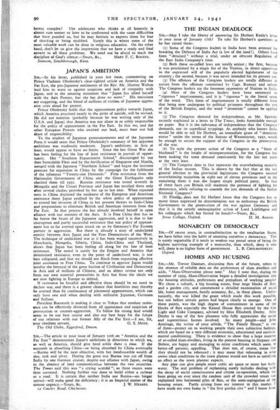THE INDIAN DEADLOCK
Snt,—May I take the liberty of answering Sir Herbert Kealy's letter in your issue of January r7th? To take Sir Herbert's questions as he has raised them: (r) Some of the Congress leaders in India have been arrested for breaking the Defence of India Act (a law of the land!). Others have been " detained " -without a trial, under an obscure Regulation of the East India Company's time.
(2) Both these so-called laws are totally unjust ; the first, because it was proclaimed by a single fiat of the Viceroy, in direct opposition to the expressed will of the popularly elected legislatures of the country ; the second, because it was never intended for its present use.
(3) The offences of the Congress leaders are totally different in nature from the offences committed by Capt. Ramsay and others. The Congress leaders are the foremost opponents of Nazism in India.
(4) Most of the Congress leaders have been sentenced to " rigorous " imprisonment, and it is " rigorous " in the literal sense of the word. This form of imprisonment is totally different from that being now undergone by political prisoners throughout the rest of the British Empire, and the word " detention " cannot be applied to it.
(5) The Congress demand for independence, as Mr. Spender recently explained in a letter to The Times, looks formidable enough on paper. But it is the substance of independence that• the Congress • demands, not its superficial treppings. As anybody who knows India would be able to tell Sir Herbert, an immediate grant of "dominion status" under the terms of the Statute of Westminster, 1931, would be enough to secure the support of the Congress in the prosecution of the war.
(6) To style the present action of the Congress as a "form of blackmail" is the height of misrepresentation, for the Congress has been making the same demand consistently for the last ten years at the very least.
(7) The Congress d,oes in fact represent the overwhelming majority of the Indian masses. This is shown by the fact that at the last general election to the provincial legislatures the Congress secured overwhelming majorities , in eight out of eleven provinces and in the remaining three it was the largest single political party. In face of .these facts can Britain still- maintain the pretence of fighting for democracy, while refusing to concede the just demands of the Indian
Nationg Congress? . .
(8) Finally), does not Sir Herbert know that the Congress has so many times expressed its- determination not to embarrass the British Government --in the -prosecution .of the war against Germany and that it is the utterly unimaginative action of Lord Linlithgow and his colleagues which has forced its hands?—Yours, &c.,






























 Previous page
Previous page